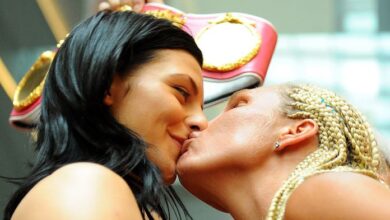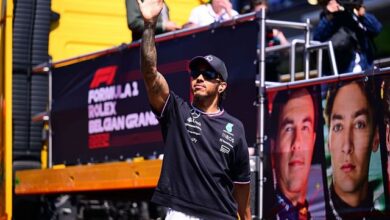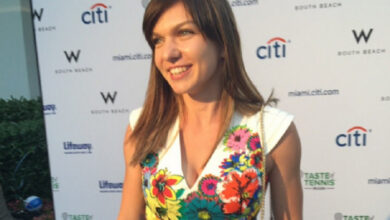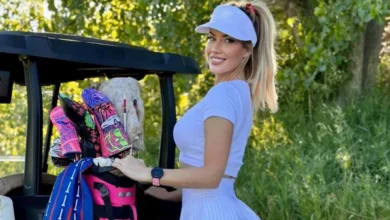In brilliant 18-month period, David Duval supplanted Tiger Woods as king of golf | Gene Frenette
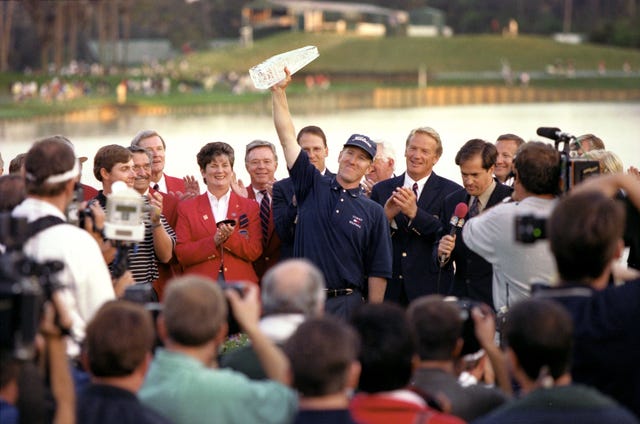
David Duval hoists The Players Championship trophy after winning the event at Ponte Vedra Beach, Florida March 28, 1999. (Bob Self/The Florida Times-Union)
Editor’s Note: David Duval is No. 7 on the Times-Union’s Top 100 list of athletes from the Jacksonville area.
Looking back at David Duval’s golf career, there was almost no in-between. He endured one of the most astounding hot-or-cold streaks in the history of the game.
All four years at Georgia Tech, the Episcopal High graduate was a first-team All-American. Hot.
Despite often being in weekend contention, Duval failed to win in his first 86 PGA Tour events. Cold.
He then flipped a switch and won 11 times in his next 31 starts, taking the No. 1 world ranking from Tiger Woods for a 14-week period after capturing The Players Championship in 1999. Hot.
Six months after capturing his first major at the 2001 Open, a slew of injuries over two decades ruined any chance at him recapturing greatness. Cold.
Duval became the first golfer to shoot a final-round 59 and win a golf tournament at the 1999 Bob Hope Chrysler Classic. Hot.
He also shot a career-high 91 in the 2019 Open, taking a 14 at the par-5 seventh hole, which tied for the worst one-hole score at any major in 28 years. Cold.
All those highs and lows made for a whirlwind career, one that might cause some golfers to engage in a lot of what-if reflection.
Duval, ranked No. 7 among the 100 Greatest Athletes in the Jacksonville area, sees no point in tormenting himself over issues beyond his control. Whether it’s injuries or fate of the golf gods — like Mark O’Meara’s winning birdie putt at the 72nd hole of the 1998 Masters that kept him out of a playoff — Duval long ago came to terms with hypotheticals of what his career might have been.
“When I turned pro in 1993, if you would have said I’ll give you an Open, a Players Championship, a Tour Championship, a number one ranking, a 59, a World Cup title with Tiger [in 2000], three President Cups and two Ryder Cup [appearances], I’d say, ‘Okay, thank you, I’m good.’
“If you look at the whole body of work, I’m pretty happy with it.”
Setting world on fire
A quarter century ago, right before Woods went on a torrid streak that saw him capture 21 tournaments and five majors in a 26-month span, Duval was the talk of the golf world.
He reached the peak of his dominance at age 27, winning The Players and BellSouth Classic in back-to-back weeks in 1999 to give him 11 victories in 18 months.
That feat, matched by only Woods (three times), Jack Nicklaus (twice), Ben Hogan (twice), Arnold Palmer (twice), Byron Nelson (twice), Sam Snead and Vijay Singh, elevated Duval to an exalted place.
Stealing Woods’ thunder put him on a bullet train to stardom, though his time in the spotlight didn’t last anywhere near as long as many anticipated.
On April 12, 1999, a hatless Duval made the first of his two Sports Illustrated covers, a portrait of him in Ray-Ban sunglasses blowing on a smoking 5-iron.
The terrible irony is Duval actually did cool off after his SI debut, winning only the Buick Challenge in October, 2000, and the ‘01 Open at Royal Lytham & St. Anne’s for his final Tour victory.
Still, once he broke into the winner’s circle at the 1997 Michelob Championship at Kingsmill, defeating Duffy Waldorf and Grant Waite in a playoff, what a spectacular run of excellence Duval enjoyed.
Jacksonville resident Len Mattiace, a two-time Tour winner, estimates he was paired with Duval 5-10 times during the period when he broke into world prominence.
“I was a group behind him when David shot 59 at the Bob Hope,” said Mattiace. “That [18-month] stretch was as good a golf as you’ll ever see.”
‘Golf was easy’
During a phone interview from his Colorado home, Duval was almost at a loss for words to explain the magnificent form that propelled him to the top of the world.
“Basically, during that stretch before I got hurt, golf was easy,” said Duval. “It really paid off when I shot that 59, which was the easiest round of golf I ever played. I don’t know how to explain it better.
“If you talk to other athletes, it’s the proverbial zone. You’re just in a zone. See ball, hit ball, make birdie. It was just easy.”
Never was Duval in a better zone than at the ‘99 Bob Hope, then a five-round tournament in La Quinta (Ca.) on the PGA West Palmer Private course. He needed an eagle at the par-five 18th hole to shoot 59, showing rare emotion by clenching his fist when the 7-foot putt dropped.
Duval had 11 birdies and one eagle, never making a putt longer than 10 feet all day. Duval had to wait until third-round leader Steve Pate finished with a 66 to learn he won by one shot.
Mattiace points to Duval’s supreme confidence as the biggest factor in his meteoric rise to stardom.
“David had things going for him that put him in an elite class during that time period,” Mattiace said. “One was very good mechanics, though that’s kind of the smallest thing. What set him apart was an incredible confidence to get the job done and perform.
“What stood out to me was his fierce competitiveness like Tiger. He had a lot of drive and knew where he wanted to go. Those mental pieces of the game put him in a class with Tiger at that time.”
Duval was legit Tiger hunter
Getting the best of Tiger Woods isn’t something many golfers did when the 15-time major champion was in his prime years (1998-2010).
Only Duval, Ernie Els and Vijay Singh were able to climb above Woods to No. 1 in the world rankings during that 12-year period.
“Tiger didn’t intimidate me,” said Duval. “I knew my game was good. I just tried to play like me. His fame, his greatness never bothered me. It doesn’t make me any less good. He’s historical. I was close to great.”
Unfortunately, Duval couldn’t stay at that level. Even at his Open victory, he acknowledges shooting 65-67 on the weekend to beat Sweden’s Niclas Fasth by three shots wasn’t his best golf.
He hung on by hitting what he believes was the greatest shot of his career, a 6-iron from high, wispy grass that reached the 15th green on Sunday and allowed him to save par.
“I knew that shot was win or lose,” Duval said. “I was making at least a double [bogey] if I didn’t pull it off,”
Raising the claret jug for his first major turned out to be almost the beginning of the end. Four months later on his 30th birthday, Duval won for the last time at the Dunlop Phoenix tournament on the Japan tour.
Sabotaged by a broken body
For most of the remainder of his Tour career, Duval’s body betrayed him in multiple ways, turning the former superstar into a golfer nobody recognized
He dealt with a broken wrist, tendinitis and bursitis in both shoulders, two broken fingers, torn calves in each leg, a broken toe and disc replacements in his neck.
But none of those ailments were as discomforting for a longer period than Duval’s back problems, which started in 2000, the year before he won the Open, and hobbled him intermittently for a long time.
“I did all kinds of rehab and swam to get my back to calm down,” said Duval. “I remember laying on the floor 10-12 hours a day at my house in Idaho for about six weeks. I still had back issues for another decade, but at least I got to the point where I could play.”
He just would never again play at a level to challenge Tiger or anybody else.
After the 2002 season, Duval missed 156 cuts and withdrew 11 times in 236 Tour events, an astonishing downfall for one of the game’s most accomplished players.
Yet out of nowhere, he somehow managed to turn back the clock for one week at the 2009 U.S. Open at Bethpage. After being tied for the lead with two holes remaining, Duval finished second by two shots to winner Lucas Glover.
In 22 other events that year, Duval missed 16 cuts and had one withdrawal. Between injuries, family obligations and focusing on a television analyst career with ESPN and The Golf Channel, any chance of Duval being a great player again had long since vanished.
“I think everybody felt for David,” Mattiace said. “Even though we’re trying to beat each other’s brains out, you felt for the guy because of how good he was and he wasn’t able to recapture that.
“What are you going to do? Injuries are tough. I had only one top-10 after my skiing accident [tearing both ACLs in 2004].”
Pining for a career revival
As his golf game began deteriorating in 2003 and never recovered, Duval was able to maintain a good perspective because it coincided with meeting the woman of his dreams: Susan Persichitte.
They met at a Colorado restaurant in August, 2003, got engaged within three months and married in 2004. Persichitte already had three children (Dean, Nick and Shalene) and the couple later had two more kids together, Brady and Sienna, now 19 and 17.
Over the past two decades, one of David’s greatest thrills was winning the 2016 PNC Father/Son Challenge in Orlando with his second-oldest stepson, Nick Karavites. They shot 21-under-par in the two-day scramble format and Duval reveled in the joy of an ensuing family celebration.
At 52, two years into playing full-time on the Champions Tour — his best finish is a third-place tie in June at the Principal Charity Classic — Duval would like nothing more than to get back into the winner’s circle for Susan and the whole family.
“I found exactly what I want in a wife,” said David. “She was nice enough to marry me and give me kids. As our life flowed, I got to the point where I wanted my family to see what I did and that I was good at something.
“That’s why I tried to put my game back together and almost won the U.S. Open. I have every intention of winning some Champions Tour tournaments so my family can see me winning.”
Whether David Duval can hoist a Champions Tour trophy remains to be seen. But it doesn’t change what he once was, if only for a brief time: the best golfer in the world.
Gfrenette@jacksonville.com: (904) 359-4540; Follow him on X, formerly Twitter, at @genefrenette
No. 7: DAVID DUVAL/GOLF
Age: 52
High School: Episcopal
College: Georgia Tech
Accomplishments: A 13-time winner on the PGA Tour, including the 2001 British Open, Duval is only the 16th player in history to win at least 10 tournaments before his 28th birthday. … Became Jacksonville’s first major champion on July 22, 2001, scoring a 10-under 274 at Royal Lytham and St. Annes to finish three shots clear of Sweden’s Niclas Fasth. … Won four events in 1999, including a two-shot victory over Scott Gump at The Players Championship, to catapult him to No. 1 in the World Golf Rankings. … He and Vijay Singh are the only other golfers to seize the top ranking during Tiger Woods’ prime between June 1998 and October 2010. … Finished first or second on the Tour money list from 1997-99 and held the No. 1 ranking for a total of 15 weeks in 1999. … He opened that season with a nine-shot victory over Mark O’Meara at the Mercedes Championships in Hawaii, then followed two weeks later with a record-tying, final-round 59 to win the Bob Hope Chrysler Classic in La Quinta, Calif. … Became the first golfer to win a tournament by shooting a sub-60 score in the final round, a feat since duplicated only by Stuart Appleby at the 2010 Greenbrier. … His glorious 1999 season was also highlighted by being part of the victorious U.S. Ryder Cup team, beating Jesper Parnevik 5-and-4 in singles on the last day to help the Americans overcome a four-point deficit in Brookline, Mass. … Was the Tour’s leading money-winner in 1998 ($2,591,031) and winner of the Byron Nelson Award and Vardon Trophy for low scoring average (69.13). … Captured four 1998 tournaments: the Tucson Chrysler Classic, Shell Houston Open, World Series of Golf and Michelob Championship at Kingsmill. … Tied for second at The Masters in 1998 when Mark O’Meara sank a birdie putt on the 72nd hole, and later placed second at the 2001 Masters, two strokes behind Woods. … In 1997, he became the first player since Nick Price (1993) to win three consecutive starts by closing the year with victories at the Michelob Championship (his first Tour win), Walt Disney World/Oldsmobile Classic and The Tour Championship, a one-shot win over Jim Furyk. … Three season-ending wins enabled him to finish second on the money list behind Woods with $1,885,308. … Finished 11th on the 1995 money list with a then-rookie record earnings of $881,436, placing second at three tournaments with eight top-10 finishes in 26 events. … The following year, he won $977,079 to finish 10th on the money list. … Qualified for the PGA Tour by finishing eighth on the 1994 Nike Tour money list. … Qualified for the ‘96 Presidents Cup and posted a 4-0-0 record. … His last victory came at the 2001 Dunlop Phoenix tournament in Japan on his 30th birthday. … After several years of declining results due to injuries, Duval had a brief career revival in 2009 when he finished tied for second at the U.S. Open, two shots behind Lucas Glover. … The following year, he was also runner-up to Dustin Johnson at the AT&T Pebble Beach National Pro-Am. . . . At Georgia Tech, he became only the third player in history, following Gary Hallberg and Phil Mickelson, to earn first-team Division I All-American for four years. … Twice finished runner-up at the NCAA Championships, placing one shot behind Arizona State’s Todd Demsey in 1993. … Qualified for 1990 U.S. Open as an 18-year-old and made the cut, finishing 56th. … Named Times-Union Golfer of the Year in 1989 with a nine-hole stroke average of 35.2 as a senior at Episcopal. … Runner-up at FHSAA state golf meet with two-day total of 141.
Deserving because: He established himself as one of the world’s preeminent golfers over a three-year period. Winning the Open for his only major triumph ensured him of keeping a top-10 ranking on this list.
On getting back to playing golf competitively on a consistent basis after a prolonged absence: “What’s been hard is it took me a year to get used to playing a full schedule. When you’re playing only five or six events a year, it’s hard to be in contention because your mental game isn’t as sharp. What’s nice about the Champions Tour is most weeks, I can come home for one or two nights. It’s nice to have the competitive juices flowing again.” — David Duval.
Where he is now: Duval lives in Cherry Hills, Colo., with his wife, Susan Persichitte, and their 19-year-old son, Brady, and 17-year-old daughter, Sienna. He also has three adult-age stepchildren. He is now playing close to a full schedule on the Champions Tour, his best finish being a tie for
third at the Principal Charity Classic in Des Moines, Iowa. He previously did television work for both The Golf Channel and ESPN.

